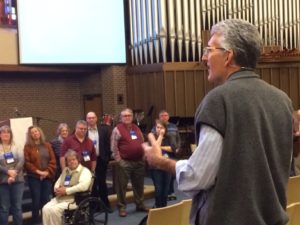
Sky Kershner, Executive director of the Kanawha Pastoral Counseling Center, asks attendees to arrange themselves according to the month they were born during the Professional Boundaries Workshop at the United Methodist Temple In Beckley on Nov. 7.
A pastor helps a confused, elderly congregant who keeps forgetting to pay her bills. He goes to her place once a month to help out. After a couple of months, the pastor — an ethical person — suggests the bills be paid online. The congregant says OK, but asks the pastor not to tell her daughter. The pastor agrees. Several years pass and the congregant dies. A few weeks later the pastor goes to see the daughter and gives her the congregant’s password and account information. The daughter is highly suspicious and demands the church do an audit, which costs the church $5,000.
This was one of several case studies discussed at the conference’s first professional boundaries training workshop on Thursday, Nov. 8, at the United Methodist Temple, Beckley.
Eighty-seven people, mostly clergy, attended the workshop, which is mandatory for clergy and some others in leadership positions. Five more workshops will be offered around the state.
Sky Kershner, executive director of the Kanawha Pastoral Counseling Center in Charleston, served as facilitator at the workshop in Beckley.
Kershner had the attendees break into groups of four numerous times throughout the day to consider a variety of topics, such as: What is a boundary? What kind of boundaries are there? How many scripture texts can you think of that involve boundaries?
He took many comments from the attendees and enlivened the meeting with several relevant jokes. Kershner even slipped in a reference to “Life of Brian,” the 1979 British film by the comedy group Monty Python.
“How did Jesus manage boundaries?”
Kershner noted that cults have rigid boundaries (“It’s hard to get in and sometimes very hard to get out!”) and pointed out that the United Methodist Church — which uses the slogan, “Open hearts, open minds, open doors” — is marketing itself as having open boundaries.
Among the questions he had attendees discuss were, “How did Jesus manage boundaries? What’s the best advice you ever got about boundaries and being a clergy person/religious leader?”
One attendee said the best advice she received was, “Don’t set yourself up to be accused.”
Another attendee said that a former bishop told him, “You have as much authority for which you are willing to assume responsibility.”
Kershner cited author Marilyn R. Peterson’s definition of the word boundary: “Boundaries are the limits that allow for a safe connection in the professional-parishioner relationship, based on the parishioners needs.”
Kershner said research conducted in 2011 on clergy boundaries found that clergy have difficulty maintaining professional boundaries and problems accurately imagining the impact of their behavior and words on others.
To put it another way, “We assume the way we see things is the way other people see things and then we’re surprised when others see things differently,” he said.
He said the group with the most complaints and lawsuits are white males aged 50 to 65.
Beware triangulation
One discussion focused on triangulation: A situation in which one person will not communicate with, or has a dispute with, another person — and a third person is brought in to deal with the “problem” in a way that does not involve that third person.
“This happens in congregations,” Kershner noted. “You come to a new congregation. Have you had people come to you in the first month who want to tell you, ‘Be careful about this person?’ That’s talking about people who are not there. Jesus called it ‘gossip.’ (The late author Stephen Covey) called this ‘disloyalty to the absent.’”
Rev. Dr. Bonnie MacDonald, the conference’s director of leadership formation and ministry staff, closed the workshop by highlighting the handouts made available to attendees.
The handouts included a copy of the conference’s sexual ethics policy, the conference’s safe sanctuaries policy, relevant excerpts from the 2016 Book of Discipline, a paper on developing a local church policy statement on sexual misconduct, plus several articles and lists of resources.
Future workshops
Future workshops are scheduled for Feb. 11 at Life UMC, Fairmont; Feb. 12 at Christ UMC, Wheeling; and May 7 Main Street UMC, Petersburg. There also will be a workshop Saturday, Aug. 24, 2019 in Charleston at a location to be announced.
All of the workshops are from 9:30 a.m. to 3:30 p.m. Lunch and all materials are provided at no cost to participants. Six contact hours of continuing education are awarded to attendees.
For more information and to register for an upcoming workshop, follow this link.